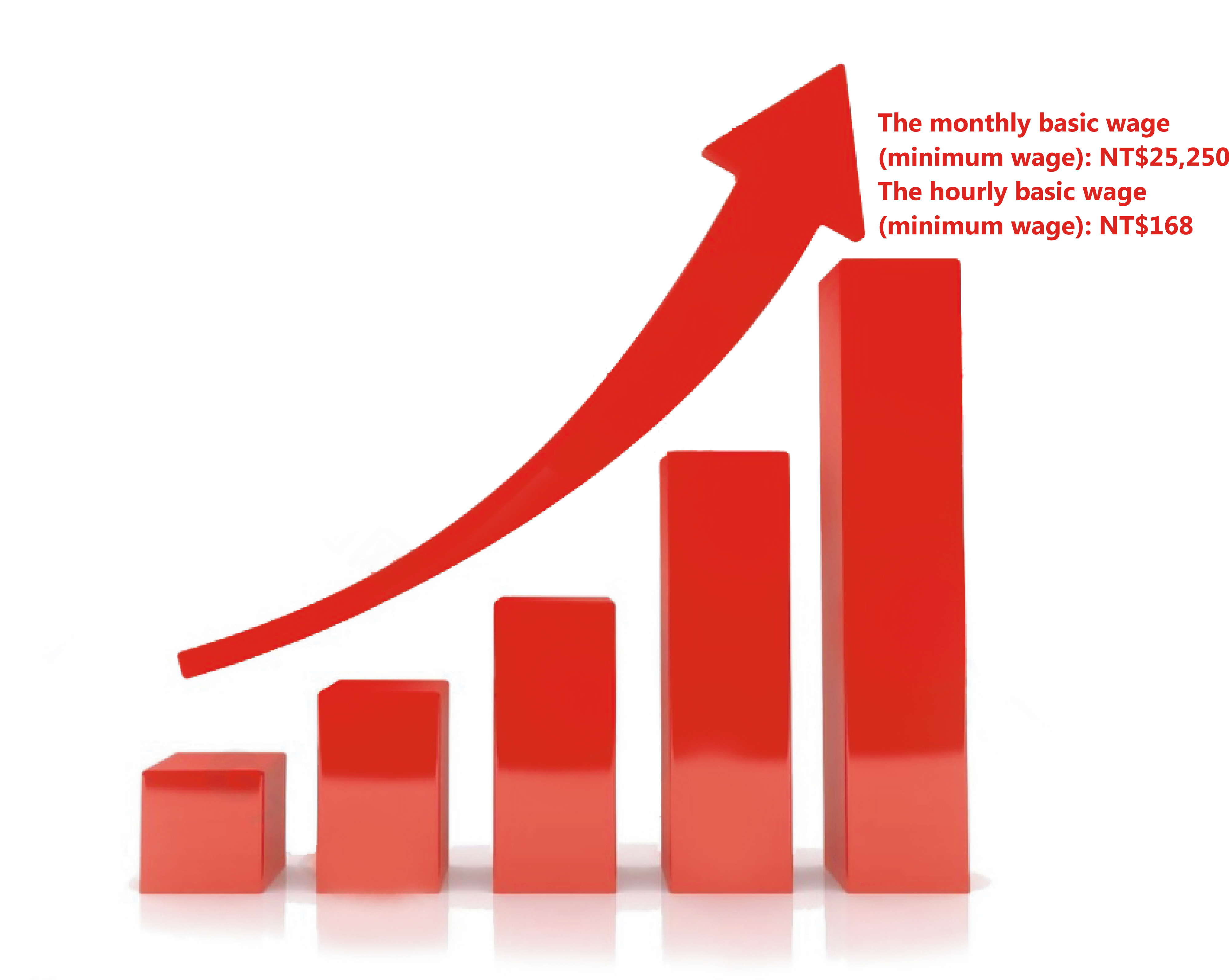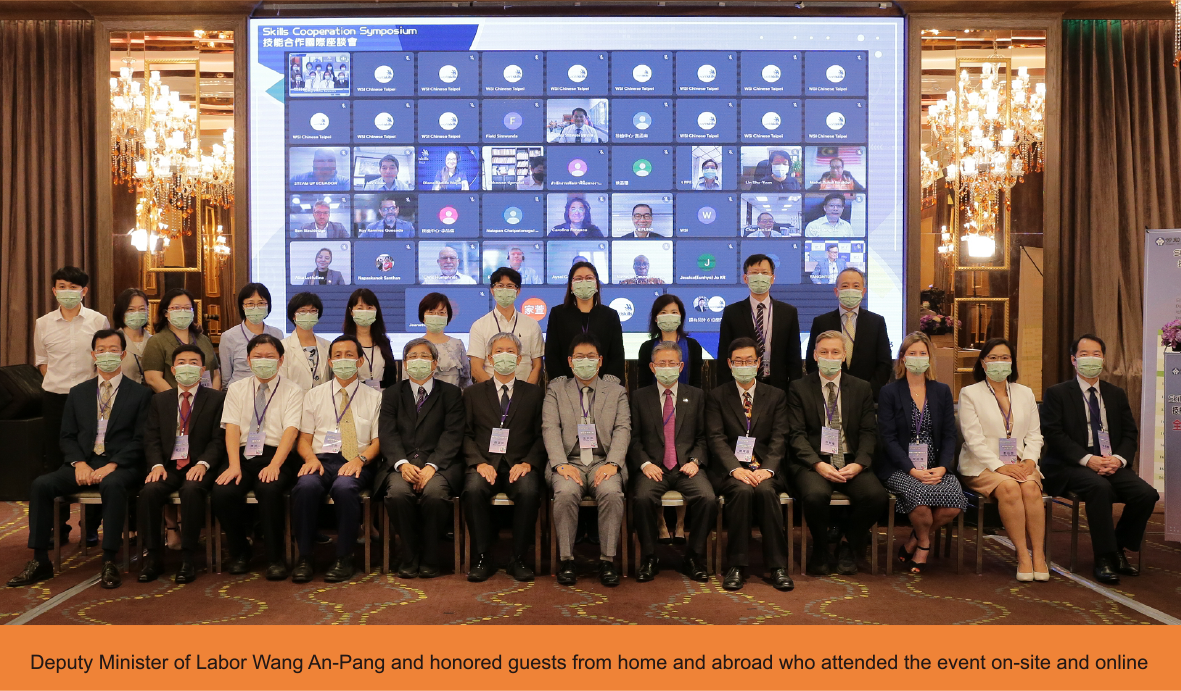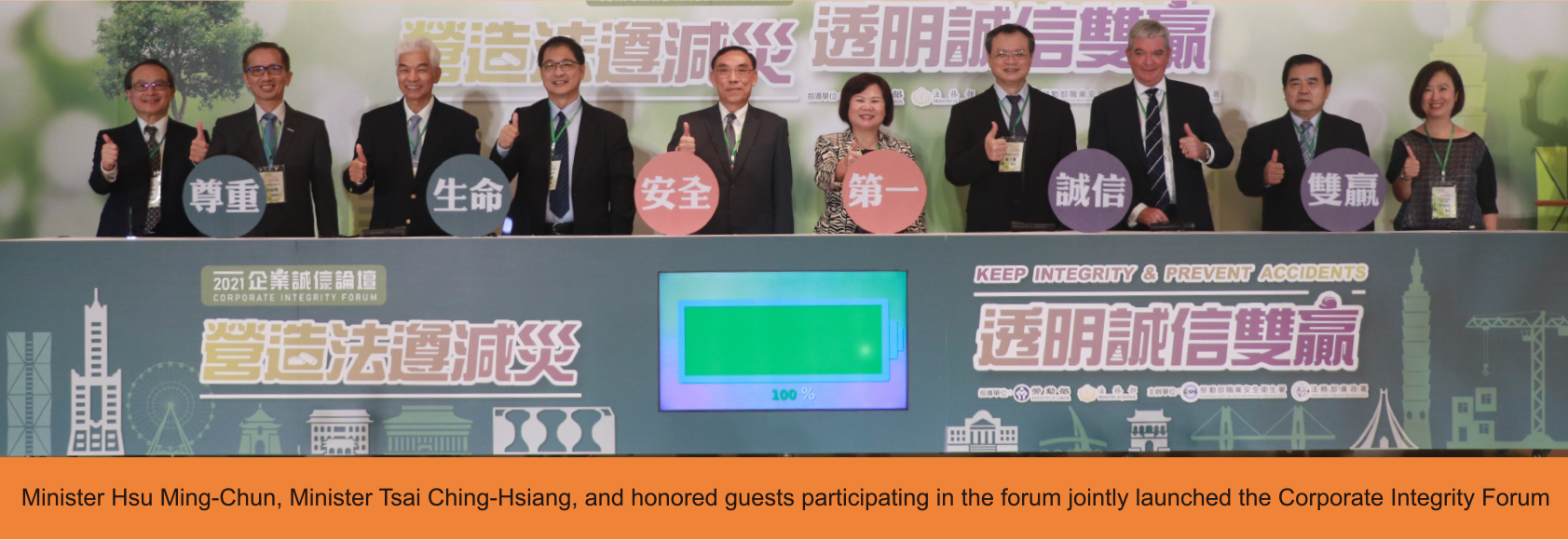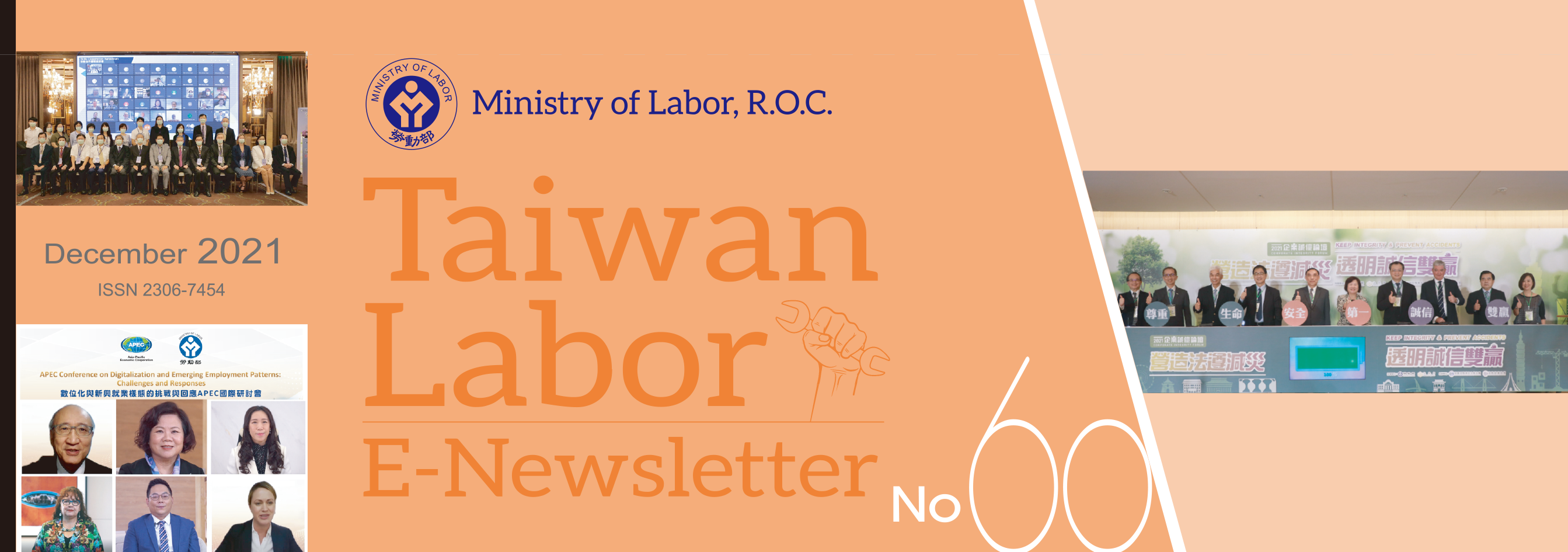No.60
- Last updated:2021-12-28
- Clicks on the following title, but browses this article fast
- Policies & Regulations Adjustments to Basic Wage (Minimum Wage) Starting from January 1, 2022, the Extra Day (Night) Duties Undertaken By Workers Shall All Be Included in the Working Time, and Overtime Pay Shall Be Paid When Working Overtime The Ministry of Labor Urges Trade Unions to Hold All Statutory Meetings in Accordance With the Laws and Regulations On Epidemic Prevention, Taking Into Account Both the Rights of Their Members As Well As Epidemic Prevention and Safety
- News Outlook The Ministry of Labor Held the APEC Conference on "Digitization and Emerging Employment Patterns: Challenges and Responses" to Continue Exchanges With Member Economies and Enhance Partnerships Ministry of Labor Held the "Skills Cooperation Symposium." Innovation in Skills Development Turns Pandemic Challenges Into Opportunities The Ministry of Labor Cooperates With the Ministry of Justice to Hold the "2021 Corporate Integrity Forum," Hoping to Implement Occupational Safety to Protect Workers
Adjustments to Basic Wage (Minimum Wage)

The monthly basic wage (minimum wage) will be adjusted to NT$25,250 and the hourly basic wage (minimum wage) to NT$168 starting January 1, 2022.
The Ministry of Labor (MOL) holds meetings of the Basic Wage Commission annually in accordance with the law to review the basic wage (minimum wage). The 36th meeting was held on October 8, 2021, and the conclusion on the adjustment of the basic wage (minimum wage) was reached after discussions by the representatives from labor organizations, employers' organizations, academia, and the government. After the adjusted policy proposed by the MOL to the Executive Yuan was approved, it was announced on October 15, 2021, and will take effect starting from January 1, 2022.
Raising the basic wage (minimum wage) from NT$24,000 to NT$25,250 will benefit approximately 1.9428 million workers. Raising hourly basic wage (minimum wage) from NT$160 to NT$168 will benefit approximately 511,100 workers.
Since President Tsai took office, the basic wage (minimum wage) has been adjusted in 6 consecutive years. The monthly wage has increased from NT$20,008 before she took office to NT$25,250, a rise of approximately 26.2%. The hourly wage has been adjusted 7 times, from NT$120 to NT$168, a total increase of 40%. The government is determined to take care of grassroots workers. In addition, for this adjustment of the basic wage (minimum wage), the Ministry of Economic Affairs has planned supporting measures to provide assistance to some industries that have been affected by the pandemic and are still suffering from weak domestic demand.
Keywords: Basic Wage (Minimum Wage), NT$168, NT$25,250
Starting from January 1, 2022, the Extra Day (Night) Duties Undertaken By Workers Shall All Be Included in the Working Time, and Overtime Pay Shall Be Paid When Working Overtime

The "Important Note for Business Entities Implementing Extra Day (Night) Duties for Workers" will cease to have effect on January 1, 2022. If employers make workers undertake extra day (night) duties, they should refer to the relevant regulations for overtime work in the "Labor Standards Act". Employers must meet requirements on the upper limit on regular working times and overtime work, and also must meet the requirement that states working hours that exceed regular working times shall be included in the number of overtime hours, overtime wages shall be paid accordingly.
This important note was formulated in 1985. Its main purpose was to regulate business entities arranging workers to receive and forward urgent documents, answer phone calls, inspect workplaces, and make reports and communications in the event of emergencies outside of working times. Time spent on these tasks had not been regarded as working hours in the past. To protect workers' rights, the Ministry of Labor revised this important note on March 11, 2019. A recommended amount of extra day (night) duty allowance has been added, which should not be less than the monthly basic wage (minimum wage) divided by 240 and multiplied by the number of hours of extra day (night) duties. In addition, the regulation that states "female workers shall not be allowed to undertake extra night duties" has been revised. Regulations on employers providing necessary safety and health facilities to promote gender equality in the workplace have been added. However, workers who are pregnant or are breastfeeding are still prohibited from undertaking extra night duties.
The nature of the extra day and night duties means that workers are still under the command and supervision of the employer and therefore their work should be included in their working times. When it was revised in 2019, it was also announced in advance that the important notes will cease to have effect from January 1, 2022. This gave business entities the appropriate time to respond.
Keywords: Extra Day (Night) Duty, Working Time, Overtime Pay
The Ministry of Labor Urges Trade Unions to Hold All Statutory Meetings in Accordance With the Laws and Regulations On Epidemic Prevention, Taking Into Account Both the Rights of Their Members As Well As Epidemic Prevention and Safety

The Ministry of Labor (MOL) stated that, in response to the lowering of the national epidemic alert level to level 2 by the Central Epidemic Command Center (CECC) since July 27, 2021, relevant regulations on gatherings and epidemic prevention have also been gradually adjusted and relaxed. Statutory meetings and related activities of trade unions can be held as long as epidemic prevention regulations are met. The latest epidemic prevention measures and regulations should be strictly followed to take into account the rights of members and ensure epidemic prevention and safety.
The MOL stated that during the nationwide level 3 epidemic alert period, to reduce the risk of group infection, the MOL once wrote to all trade unions and asked them to suspend their meetings and related activities. However, considering that trade unions still needed to resolve important issues through meetings during the epidemic period to protect the rights of their members, they agreed and encouraged that trade unions should adopt video conferences to convene meetings. They also provided important notes for holding video conferences to confederated labor unions managed by local governments' Labor Affairs Bureaus (Departments of Labor) and the MOL to facilitate the compliance of the trade unions within their jurisdictions and their affiliated members' trade unions. This allowed trade union affairs to operate normally during the epidemic.
Finally, the MOL stated that the CECC announced that the national epidemic alert has been lowered to level 2 since July 27. They have also successively adjusted relevant regulations for gatherings and relaxed epidemic prevention control measures. Therefore, the MOL has again issued a notice to the confederated labor unions managed by local governments' Labor Affairs Bureaus (Departments of Labor) and MOL on October 6, requesting their assistance to notify the trade unions within their jurisdictions and their affiliated members' trade unions. All statutory meetings of trade unions shall be held as soon as possible through video conferences or through physical meetings that meet epidemic prevention regulations in accordance with the relevant regulations of the "Labor Union Act" and the unions' own regulations. All trade unions should remain vigilant and strengthen precautions when holding physical meetings and activities. They must abide by the latest epidemic prevention regulations (including regulations on food and drink, the maximum number of participants for indoor and outdoor meetings and activities, contact tracing, and social distancing) announced by the CECC and the county (city) government where the activities are held.
Keywords: Statutory Conferences, Video Conferences, Physical Conferences
The Ministry of Labor Held the APEC Conference on "Digitization and Emerging Employment Patterns: Challenges and Responses" to Continue Exchanges With Member Economies and Enhance Partnerships

The Conference was held virtually in the mornings of October 21 to 22, 2021, Taipei time. The Ministry of Labor invited experts and scholars from APEC economies, including Australia, Republic of Korea, Malaysia, the US, and New Zealand, as well as representatives from the APEC Business Advisory Council (ABAC), International Trade Union Confederation-Asia Pacific (ITUC-AP) and the International Organisation of Employers (IOE). They jointly discussed the emerging employment patterns under digitalization, the impact on the labor market and social security protection system, and APEC economies' policy responses and recommendations. Over the two days, a total of more than 260 domestic and foreign audience members participated through online videoconferencing and YouTube. They asked many questions about the topics discussed, highlighting the importance of these topics and the attention they have received from various economies.
Keywords: APEC, Digitization, Emerging Employment Patterns
Ministry of Labor Held the "Skills Cooperation Symposium." Innovation in Skills Development Turns Pandemic Challenges Into Opportunities

The Workforce Development Agency (WDA), Ministry of Labor (MOL) held the "Skills Cooperation Symposium" on September 30, 2021, which drew 151 guests from 25 countries, including foreign representatives in Taipei and delegates from industry, government, and academia related to skills development affairs. This Symposium was held in a hybrid format (physical and virtual) with the theme "Global Skills Development and Challenges Under the Impact of the Pandemic." As this year is WorldSkills International's (WSI) year of innovation, the MOL hopes to improve and advance global skills development through collaboration with innovative models.
In response to the COVID-19 pandemic, this Symposium conducted through video conference invited WSI Board Member Mr. Michael Fung, Senior Youth Advisor of the African Union Commission Mr. Nicholas Ouma, Official Delegate for the Republic of Korea Mr. Yanghyun Kim, Juniors Coordinator of WorldSkills Russia Ms. Aliia Lutfullina, Deputy CEO of WorldSkills UK Mr. Ben Blackledge, and Technical Delegate for Malaysia Mr. Mohd Zuhdi Ibrahim as keynote speakers. Faced with the global pandemic, we call upon all countries to discuss international and regional skill development trends and strategies with innovative ideas for promoting skills exchanges.
The WDA stated that the Symposium provided an excellent platform for international partners to exchange their experiences. By sharing innovative and forward-looking approaches to skill development with different perspectives from the WSI, WorldSkills Asia, and other countries, the WDA hoped to strengthen international cooperation and make the world better with the power of skills.
Keywords: International Symposium, Capacity Building, Skills Cooperation
The Ministry of Labor Cooperates With the Ministry of Justice to Hold the "2021 Corporate Integrity Forum," Hoping to Implement Occupational Safety to Protect Workers

The Ministry of Labor (MOL) and the Ministry of Justice (MOJ) jointly held the "2021 Corporate Integrity Forum" on November 9. In addition to inviting Taiwan's outstanding companies from construction-related industries to participate, it also connected with the Health and Safety Executive (HSE) to share the UK's successful experience in corporate integrity promoting occupational safety and health governance. They invited the CEO of Continental Engineering Corporation Simon Buttery and Chi Mei Corporation Vice President Li Jian-Xing to give keynote speeches. Director-General Tzou Tzu-Lien of the MOL's Occupational Safety and Health Administration (OSHA), Director-General Cheng Ming-Chian of the MOJ's Agency Against Corruption, Director-General Hsu Cheng-Chang of the Ministry of Transportation and Communications' Directorate General of Highways, British Office Taipei's Director of infrastructure Lynn Li and Transparency International Chinese Taipei Vice Chairman Kevin I. J. Yeh participated in the forum. The forum emphasized that corporations should operate with integrity and implement occupational safety laws and regulations to create a win-win situation for corporations, workers, and the government.
Minister of Labor Hsu Ming-Chun stated that construction plays an important role in promoting national infrastructure and driving Taiwan's prosperous economic development. Due to the complex division of labor and long construction period, the risk of occupational accidents happening is higher than that of other occupations. The MOL has particularly designated 2021 as the year for reinforcing the reduction of construction accidents. In addition to increasing the construction industry's inspection capacities and adopting diligent inspections and severe penalties, it also established the "State-Owned Corporation Accident Reduction Cross-Department Platform" to strengthen the performance of public construction safety management. The "Occupational Safety and Health Digital Learning Platform" was also developed to enhance workers' hazard identification and knowledge on safety and health. Furthermore, business owners were called upon to manage their enterprises with integrity and implement occupational safety laws and regulations, which are concrete demonstrations of corporate social responsibility.
The theme of this forum was "Compliance in the Construction Industry to Reduce Accidents and the Creation of a Win-Win Situation with Transparency and Integrity." Through experience sharing by advanced countries and Taiwan's benchmark corporations, topics such as compliance in the construction industry to reduce accidents, corporate integrity management trends, the construction industry's occupational safety benchmark learning, integrity governance advantages, and public and private sectors working together to provide high-quality occupational safety and healthy environments were discussed. The MOL, the MOJ, and business owners from the construction industry participated to jointly implement occupational safety and health act and measures, reduce occupational accidents in the construction field, and strengthen regulatory compliance and integrity management. They hope through cross-domain integration, workers' health and safety in the workplace will be ensured, occupational accidents will be reduced, and happy and friendly working environments will be created.
Keywords: Corporate Integrity, Occupational Safety and Health Governance, Construction Accident Reduction
- Source:Department of General Planning
- Publication Date:2021-12-16
- Count Views:
File
- Taiwan Labor E Newsletter NO-60 pdf

